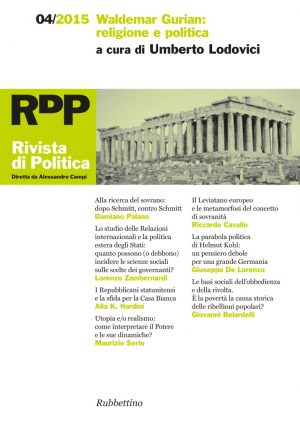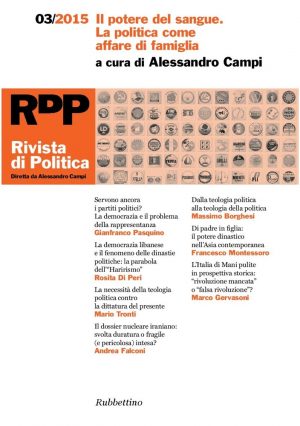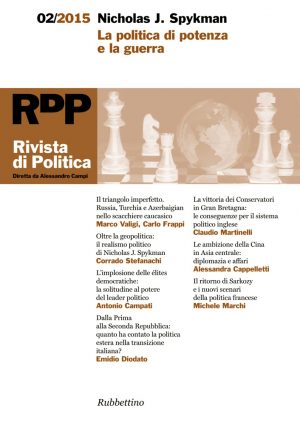01/2015 – Damiano Palano. Sigmund Freud e la tradizione del realismo politico
ISSN: 2037-495X
8,50€ – 11,00€
Descrizione
Sommario:
congetture & confutazioni
Syriza e Podemos. Un altro mondo (a sinistra) è possibile?, Marco Damiani
Renzi e la lezione di Machiavelli, Alberto Bitonti
Renzi e Mattarella: il leader liquido e l’argine della tradizione, Guerino Nuccio Bovalino
La Grande Guerra tra commemorazioni e banalizzazioni, Leonardo Varasano
Le lezioni della crisi ucraina, Valter Coralluzzo
Come sta cambiando la geopolitica del Vaticano, Alessandro Grossato
archivio del realismo politico
Il coraggio del realismo: Hans J. Morgenthau e Reinhold Niebuhr Luca G. Castellin
Teologia politica contro ragione politica: Raymond Aron, Hans J. Morgenthau e il concetto del politico Daniel Steinmetz Jenkins
osservatorio internazionale
Sul “nuovo” Front national: dinamica elettorale, leadership e proposta politica Nicola Genga
La dipendenza tra gli Stati nell’epoca della globalizzazione Teodoro Klitsche de la Grange
teoria politica
La legge del padre. Alla ricerca del realismo politico di Sigmund Freud Damiano Palano
Il sovrano amministratore della Verità: Thomas Hobbes e il concetto di truth in logica e in politica Alessia Sorgato
storia e politica
Un’unione senza barriere? Modelli di federazione economica nel dibattito britannico, 1934-1944 Tommaso Milani
La Grande Guerra nella lettura del marginalismo austriaco Beniamino Di Martino
Abstracts
Luca G. Castellin, The Bravery of Realism: Hans J. Morgenthau and Reinhold Niebuhr
During the twentieth century, two seminal theoreticians of political realism, Reinhold Niebuhr and Hans J. Morgenthau, contested the prevailing approach in contemporary social sciences, denouncing the alleged abuses of positivism, the problematic relationship between science and values, and the unclear boundary between description and prescription. On the one hand, the Protestant theologian studied the domestic and international politics of the United States, opposing liberal idealism and taking on an anti-Pelagian stance. On the other hand, the author of Politics Among Nations reflected on the ‘poverty’ of scientism in the study of politics and highlighted the ‘limits’ of power. Both scholars agreed with the need of not only exceeding the rationalism that united the political sciences, but also of using realism in order to better understand politics. At the same time, they reaffirmed the complexity of the ethical and normative dimension of political action. This article analyzes their contribution in order to expose its potential as well as its limits.
Daniel Steinmetz-Jenkins, Political Theology vs. Political Reason: Raymond Aron, Hans J. Morgenthau and the concept of political
This article offers an alternative explanation of the differences between Hans Morgenthau and Raymond Aron’s views on international relations theory. The conventional interpretation of Aron and Morgenthau’s ideas suggests that both thinkers were political realists who were divided by their methodological approaches to international relations. Whereas Morgenthau’s views of power politics and national self-interest rested on his anthropological claims that human beings are, by nature, selfish, Aron offered an essentially phenomenological view of international relations that stressed the cultural, religious and historical distinctiveness of nation-states – which, he claimed, could never be overcome. In this essay, I will suggest what really divided Aron and Morgenthau was the former’s suspicion that Morgenthau’s views of international relations theory was, in fact, too heavily indebted to Carl Schmitt’s political theology. I will argue that Aron was one of the first to recognize that Morgenthau had rethought Schmitt’s views to reach out to an American audience almost entirely ignorant of the latter’s writings. In the conclusion, it will be argued that Aron’s book on international relations, Peace and War, should be interpreted as an intervention into an academic discipline that he believed too beholden to political theology.
Nicola Genga, The “New” Front national: Electoral Dynamics, Leadership and Political Platform
As spring the 2014 elections clearly show, the fn is now more than ever a major political phenomenon in France. But the newsworthiness of Marine Le Pen’s party seems to affect media framing on this topic, often characterised by sensationalism and simplification. Generally speaking, commentators tend to stress the centrality of the fn in French political life and emphasize the effects of the repositioning process it has undergone by the so called dédiabolisation. This article provides an initial reflection on the three main issues at stake. First, the assumptions about the likelihood of electoral success for this party in the near future, based on both an impressionistic reading of the last municipal and European results, and an out of context interpretation of opinion polls for the 2017 presidential election. Second, the discontinuity represented by the new leadership with respect to Jean-Marie Le Pen’s legacy. This relates indirectly to a third issue, the ‘Republican’ connotation of the fn political platform. In addition, contextual conditions that allowed this party to emerge in the political system during the nineteen eighties are compared to those from which, today, it may or may not increase its electoral strength as a consequence of the political strategies chosen by its leader.
Teodoro Klitsche de la Grange, The Dependence Between the States in the Age of Globalization
In this article the author raises the question of the dialectic between the legal concept of the independence and equality of States (par in parem non habet jurisdictionem) and the real possibility of political independence. After looking at the ending of the classic forms of states with limited sovereignty (states-protected, satellite states) and of the theories of sovereignty as forms of (exterior) independence (particularly Bodin, Santi Romano, Sieyés) this article briefly evaluates the current forms of political dependence (though not legal) and, consequently, the new types of warfare. In the conclusion, the globalizing powers less suitable to ensure the balance between force and law are taken into consideration – a balance on which the jus publicum europeum is based.
Damiano Palano, The Law of the Father: In Search of Sigmund Freud’s Political Realism
This article examines Sigmund Freud’s writings on society and collective psychology in which the founder of psychoanalysis offers an ambitious vision of social and political order. As this article will argue, in Freud’s social theory one might identify some basic ideas of classical political realism (for example the conception of ‘human nature’, or the explanation of the leader-masses relationship). At the same time, Freud provides two different versions of political realism: a first version is developed in his Totem and Taboo, and Group-Psychology and the Analysis of the Ego; the second, more pessimistic version emerges especially in Civilization and its Discontents, in which Freud developed the concept of ‘death drive’ (Todestrieb).
Alessia Sorgato, The Sovereign Administrator of Truth: Thomas Hobbes and the Concept of Truth Between Logic and Politics
This essay examines two of Hobbes’s concepts of truth: the logical definition of truth and the political concept. The first one is insufficient to establish a political discourse and needs the second kind of truth, which is the result of Hobbesian power and therefore of the sovereign’s legislative function. The Leviathan must be the only centre of the preaching and the administration of truth. On the contrary, ‘false’ is understood as everything that collides with the sovereign’s word, in other words, what linguistically encourages the dissolution of the body politic.
Tommaso Milani, A Union Free From Barriers? Models of Economic Federation in the British Debate, 1934-1944
The ongoing crisis of the European Union has spurred a debate which is heavily emotional and utterly confused. A major source of bewilderment lies in federalism, an ideology whose economic underpinnings have been rarely investigated and seldom grasped. This article sets out to illustrate two competing models of federalism which emerged in Britain between 1934 and 1944: a liberal and a socialist one. It then goes on to draw a distinction between the latter’s democratic-socialist and radical-collectivist strands. A third position, that of socialist anti-federalism, is also accounted for. By stressing diverging attitudes towards the abolition of trade barriers and the degree of economic planning to be undertaken at federal level, the article highlights the lack of consensus among federalists as well as the conceptual objections raised by prominent left-wing intellectuals to all projects aimed at surrendering national sovereignty. This article argues that resorting to models may enhance the quality and depth of the contemporary discourse on the future of the EU and help to overcome its current deadlock.
Beniamino Di Martino, The Great War in the Reading of Austrian Marginalism
The world is commemorating one-hundred years since the outbreak of the First World War. It is a momentous occasion to remember, commemorate, and attempt to elaborate what were the pivotal reasons behind the outbreak. Normally, the historiographical reconstructions are predominantly unilateral, leaving little room for valid and more thought-out alternative perspectives. A good example is represented by the school of economic thought that goes by the name of ‘Austrian School’. One of its fundamental pillars was the marginalism of Carl Menger, whose contributes in many areas of economic and social sciences are undisputed. On this premises, respectful thinkers of the caliber of Mises, Hayek, Popper, and Rothbard, positing the pervasive and intrinsic evil nature of the state, have always considered the ‘total war’ the inevitable consequence of the creation of the ‘total state’. This interpretation allows for a more meaningful and accurate understanding of the First World War by pointing out the very nature of that conflict, vis-à-vis the clash of states, and not a conflict among peoples. Furthermore, the First World War represents the dramatic overture of a century that has witnessed the consequences stemming from the perfect State.






